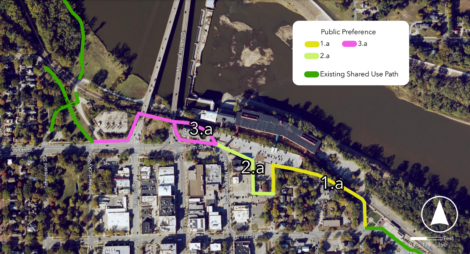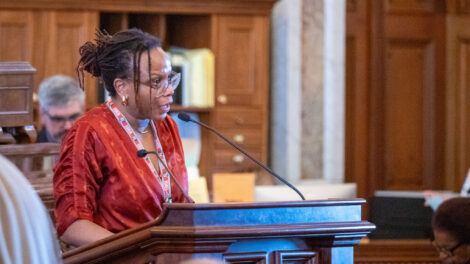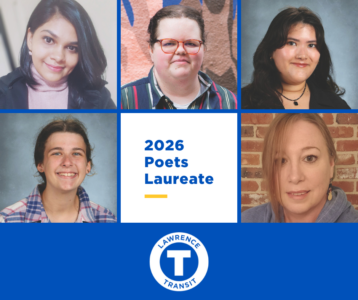Lawrence’s closed-door Community Budget Committee has connections to nonprofits, government and public administration

photo by: Bremen Keasey
Lawrence City Hall at 6 East 6th St pictured on Dec. 10, 2024.
A few details are starting to emerge about the closed-door Community Budget Committee created by Lawrence City Hall.
For one, the seven-member group tasked with providing advice on what is expected to be a difficult 2026 city budget has a strong connection to local governments, nonprofits and the field of public administration. For another, Lawrence City Manager Craig Owens had the final say in selecting the group’s seven members from a field of about 60 applicants.
At the request of the Journal-World, city officials recently provided more information about the new group that was announced on Dec. 2. During that announcement, the city provided the names of the committee members and announced that its meetings would not be open to the public, in order to give the committee the freedom to discuss possible cuts and other sensitive items related to the city’s upcoming budget.
But the December announcement provided no details about the background of the members or what work the committee is expected to produce for the city.
Recently, members of the committee did provide background information about themselves and why they were interested in serving on the committee. The biographical information shows a strong set of connections to government and the field of public administration. One member is the former executive director of the League of Kansas Municipalities, while another is a former public administration professor at KU, and a third is a former executive with the Federal Reserve. A connection to nonprofit agencies also was evident. One member is a consultant for nonprofits and philanthropic organizations, while another is a grant manager for a local nonprofit.
As for what work the group will do, the committee is expected to consider ways that the city can balance its budget for 2026. The city adopted a 2025 budget that has a “structural deficit” in its general operating fund, meaning that fund is expected to dip into reserve funds to cover its 2025 spending.
But whether the new committee will create a formal report for the City Commission to consider is currently unknown, a city official said. Cori Wallace, a city spokesperson, told the Journal-World there might not be a report produced by the group. Wallace said the committee has “the space to explore our budget (and) ask questions,” but the city is not “overly prescriptive” of what the end result of the group’s work will look like. Wallace said the findings of the committee would be presented to the public in some form during future City Commission meetings.
The committee held its first meeting on Dec. 11, she said. When the new committee was announced, the city said it likely would meet six times over eight months.
Additionally, the city will start an Employee Budget Committee drawn from city staff in preparation for the 2026 budget. Wallace said the city hopes both of those committees will help improve the budget process.
As for the seven members on the committee — Sarah McGreer Hoyt, James Bowen, Sheri Ellenbecker, Erik Sartorius, Jacob Fowles, Whitney Lang and Paul Carttar — Alley Porter, the city’s budget and strategic initiatives manager, said they were selected from a group of more than 60 applicants. Those applications were reviewed by the City Manager’s Office, Communications & Community Relations and the budget team, but Porter said the final decision was ultimately made by Owens.
Porter said to narrow down the final seven-person committee, the group considered diversity of experience, explored responses to multiple questions and worked to identify different perspectives on the complex work of the budget. Some residents had asked whether the city sought to have committee members who were from different geographic areas of the city. Geographic diversity wasn’t among the items the city listed in its review process. The biographical information provided to the Journal-World didn’t make clear in which areas of town the committee members reside.
The information provided by committee members did reveal some details about their past experience and the reasons they wanted to be on the new committee. Here’s a look:
• Sarah McGreer Hoyt said she went to graduate school at the University of Kansas in the late ’90s and then moved away for a while before returning to Lawrence in 2021. She is the director of grants at Boys & Girls Club of Lawrence.
She said she applied because she had rewarding experiences in the past serving on local advisory boards. She said managing budgets and responsible spending are important in her field of working on grant proposals. Additionally, as the mother of a second-grader, she said she wanted to ensure that parents have a voice in the process.
“I want to contribute my knowledge, learn, and represent the viewpoint of working parents,” she said.
• Erik Sartorius has worked in and around local government for much of his career. Sartorius, who is currently the executive director for the Communications Coalition of Kansas, previously was the executive director for the League of Kansas Municipalities for eight years and has years of experience lobbying the Kansas Legislature on municipal issues.
“I am interested in finding ideas the committee can bring forward to create budgets that are sustainable, provide quality services, and recognize limitations to residents’ capacities for additional taxes,” Sartorius said.
• Paul Carttar is an independent consultant and co-founded Bridgespan Group, a nonprofit organization that provides consulting services for philanthropists and other nonprofits.
Along with his consulting work, Carttar previously was the director of the Social Innovation Fund, an Obama-administration initiative that mobilized more than a billion public and private dollars to grow nonprofits in the areas of economic opportunity, healthy futures and youth development.
Carttar said that he cared about Lawrence having an effective government and that he hoped to “contribute thoughts, perspectives and recommendations that are realistic, relevant, experience-based and move this process forward in ways that are positive for the city and its residents.”
• Sheri Ellenbecker first moved to Lawrence with her husband in 1980, and they raised their three children in the city; all three graduated from Lawrence public schools.
Ellenbecker said she has seen a lot of change in the community over the years and has followed the budget process since 2017. She said she had a background in accounting and that she hoped to bring an average resident’s perspective to the committee.
• Whitney Lang, who works at CT Design + Development in downtown Lawrence, said she was born and raised in Lawrence and returned here to raise her daughters after spending a decade in Chicago.
Lang currently serves on the board for the Lawrence Arts Center, and she said the budget committee seemed like a great opportunity to serve the city. With more than 20 years of experience as an architect, Lang said she had experience with solving complicated problems.
• Jim Bowen worked for 32 years with the Federal Reserve Banks of Kansas City and St. Louis, holding positions in an array of fields like accounting, budgeting, information technology and human resources.
Bowen said while serving as a manager, including nine years as the Chief Operating Officer of the St. Louis Fed, he was able to become an effective mediator and consensus builder.
“Providing input from the public with no particular agenda should be a positive for the city’s budget process,” Bowen said.
• Jacob Fowles is the operations and executive pastor at Velocity Church. In that role, he oversees finance, budget, operations, human resources, and facilities, as well as the church’s local outreach activities.
Prior to working at Velocity, Fowles was a professor at KU, where he served as the Associate Director of the School of Public Affairs and Administration and the Associate Director for the Center for Research Methods and Data Analysis. He has taught graduate courses on public budgeting, public finance, public financial management, policy analysis and econometrics.







